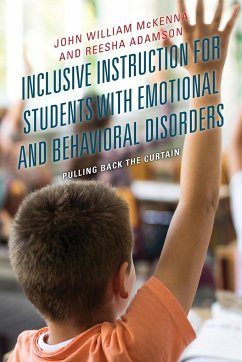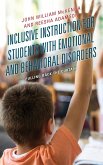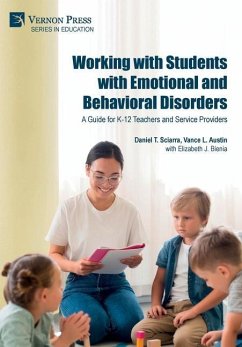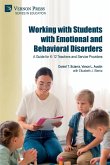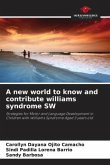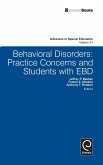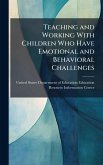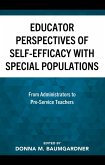Inclusive Instruction for Students with Emotional and Behavioral Disorders
Pulling Back the Curtain
Herausgeber: McKenna, John William; Adamson, Reesha
Inclusive Instruction for Students with Emotional and Behavioral Disorders
Pulling Back the Curtain
Herausgeber: McKenna, John William; Adamson, Reesha
- Broschiertes Buch
- Merkliste
- Auf die Merkliste
- Bewerten Bewerten
- Teilen
- Produkt teilen
- Produkterinnerung
- Produkterinnerung
This book is essential reading for stakeholders invested in inclusive instruction for students with emotional disturbance (ED). Research and policy-based recommendations are provided, as are resources for school-based practitioners and parents/guardians alike.
Andere Kunden interessierten sich auch für
![Inclusive Instruction for Students with Emotional and Behavioral Disorders Inclusive Instruction for Students with Emotional and Behavioral Disorders]() Inclusive Instruction for Students with Emotional and Behavioral Disorders102,99 €
Inclusive Instruction for Students with Emotional and Behavioral Disorders102,99 €![Working with Students with Emotional and Behavioral Disorders Working with Students with Emotional and Behavioral Disorders]() Daniel S SciarraWorking with Students with Emotional and Behavioral Disorders94,99 €
Daniel S SciarraWorking with Students with Emotional and Behavioral Disorders94,99 €![Working with Students with Emotional and Behavioral Disorders Working with Students with Emotional and Behavioral Disorders]() Daniel S. SciarraWorking with Students with Emotional and Behavioral Disorders58,99 €
Daniel S. SciarraWorking with Students with Emotional and Behavioral Disorders58,99 €![A new world to know and contribute williams syndrome SW A new world to know and contribute williams syndrome SW]() Carollyn Dayana Ojito CamachoA new world to know and contribute williams syndrome SW36,99 €
Carollyn Dayana Ojito CamachoA new world to know and contribute williams syndrome SW36,99 €![Behavioral Disorders Behavioral Disorders]() Jeffrey P. BakkenBehavioral Disorders176,99 €
Jeffrey P. BakkenBehavioral Disorders176,99 €![Teaching and Working With Children Who Have Emotional and Behavioral Challenges Teaching and Working With Children Who Have Emotional and Behavioral Challenges]() Teaching and Working With Children Who Have Emotional and Behavioral Challenges27,99 €
Teaching and Working With Children Who Have Emotional and Behavioral Challenges27,99 €![Educator Perspectives of Self-Efficacy with Special Populations Educator Perspectives of Self-Efficacy with Special Populations]() Educator Perspectives of Self-Efficacy with Special Populations92,99 €
Educator Perspectives of Self-Efficacy with Special Populations92,99 €-
-
-
This book is essential reading for stakeholders invested in inclusive instruction for students with emotional disturbance (ED). Research and policy-based recommendations are provided, as are resources for school-based practitioners and parents/guardians alike.
Produktdetails
- Produktdetails
- Verlag: Lexington Books
- Seitenzahl: 224
- Erscheinungstermin: 11. Mai 2022
- Englisch
- Abmessung: 229mm x 152mm x 12mm
- Gewicht: 332g
- ISBN-13: 9781498596442
- ISBN-10: 1498596444
- Artikelnr.: 63597671
- Herstellerkennzeichnung
- Libri GmbH
- Europaallee 1
- 36244 Bad Hersfeld
- gpsr@libri.de
- Verlag: Lexington Books
- Seitenzahl: 224
- Erscheinungstermin: 11. Mai 2022
- Englisch
- Abmessung: 229mm x 152mm x 12mm
- Gewicht: 332g
- ISBN-13: 9781498596442
- ISBN-10: 1498596444
- Artikelnr.: 63597671
- Herstellerkennzeichnung
- Libri GmbH
- Europaallee 1
- 36244 Bad Hersfeld
- gpsr@libri.de
John William McKenna is associate professor of moderate disabilities and an affiliate of the Center for Autism Research and Education (CARE) at the University of Massachusetts Lowell. Reesha Adamson is associate professor at Missouri State University.
Chapter 1: Introduction
Chapter 2: Free Appropriate Public Education: The Foundation of Special
Education
Chapter 3: Practices for Improving Academic Achievement: Lessons Learned
and Limitations of Intervention Research
Chapter 4: Explicit Vocabulary Instruction in the Inclusive Classroom
Chapter 5: Use of Graphic Organizers to Improve Academic Content
Acquisition
Chapter 6: Writing Instructional Strategies for Elementary Age Students
with Emotional and Behavioral Disabilities, by Robai Werunga
Chapter 7: Inclusive Mathematics Practices for Students with Emotional
Disturbance, by Jessica Nelson
Chapter 8: Differentiation of Instructions for Students with Emotional
Disturbance
Chapter 9: Using Technology to Support Inclusive Instruction for Students
with Emotional Disturbance
Chapter 10: Use of Daily Progress Reports and Behavioral Contracts to
Support Inclusive Education
Chapter 11: Function-based Thinking to Support Inclusive Instruction
Chapter 12: Trauma Informed Support: Considerations for Students with ED
Who Have Experienced Trauma, by Felicity Post
Chapter 13: The False Promise of Learning Styles Based Instruction, by John
William McKenna, Reesha Adamson, and Eliza Bobek
Chapter 14: Progress Monitoring in the Inclusive Classroom
Chapter 15: Collaboration in Inclusive Instruction for Students with ED
Chapter 16: Abandoning Readiness, by Maria Kolbe, Inclusion Facilitator
Chapter 17: Closing Commentary
References
About the Authors
About the Contributors
Chapter 2: Free Appropriate Public Education: The Foundation of Special
Education
Chapter 3: Practices for Improving Academic Achievement: Lessons Learned
and Limitations of Intervention Research
Chapter 4: Explicit Vocabulary Instruction in the Inclusive Classroom
Chapter 5: Use of Graphic Organizers to Improve Academic Content
Acquisition
Chapter 6: Writing Instructional Strategies for Elementary Age Students
with Emotional and Behavioral Disabilities, by Robai Werunga
Chapter 7: Inclusive Mathematics Practices for Students with Emotional
Disturbance, by Jessica Nelson
Chapter 8: Differentiation of Instructions for Students with Emotional
Disturbance
Chapter 9: Using Technology to Support Inclusive Instruction for Students
with Emotional Disturbance
Chapter 10: Use of Daily Progress Reports and Behavioral Contracts to
Support Inclusive Education
Chapter 11: Function-based Thinking to Support Inclusive Instruction
Chapter 12: Trauma Informed Support: Considerations for Students with ED
Who Have Experienced Trauma, by Felicity Post
Chapter 13: The False Promise of Learning Styles Based Instruction, by John
William McKenna, Reesha Adamson, and Eliza Bobek
Chapter 14: Progress Monitoring in the Inclusive Classroom
Chapter 15: Collaboration in Inclusive Instruction for Students with ED
Chapter 16: Abandoning Readiness, by Maria Kolbe, Inclusion Facilitator
Chapter 17: Closing Commentary
References
About the Authors
About the Contributors
Chapter 1: Introduction
Chapter 2: Free Appropriate Public Education: The Foundation of Special
Education
Chapter 3: Practices for Improving Academic Achievement: Lessons Learned
and Limitations of Intervention Research
Chapter 4: Explicit Vocabulary Instruction in the Inclusive Classroom
Chapter 5: Use of Graphic Organizers to Improve Academic Content
Acquisition
Chapter 6: Writing Instructional Strategies for Elementary Age Students
with Emotional and Behavioral Disabilities, by Robai Werunga
Chapter 7: Inclusive Mathematics Practices for Students with Emotional
Disturbance, by Jessica Nelson
Chapter 8: Differentiation of Instructions for Students with Emotional
Disturbance
Chapter 9: Using Technology to Support Inclusive Instruction for Students
with Emotional Disturbance
Chapter 10: Use of Daily Progress Reports and Behavioral Contracts to
Support Inclusive Education
Chapter 11: Function-based Thinking to Support Inclusive Instruction
Chapter 12: Trauma Informed Support: Considerations for Students with ED
Who Have Experienced Trauma, by Felicity Post
Chapter 13: The False Promise of Learning Styles Based Instruction, by John
William McKenna, Reesha Adamson, and Eliza Bobek
Chapter 14: Progress Monitoring in the Inclusive Classroom
Chapter 15: Collaboration in Inclusive Instruction for Students with ED
Chapter 16: Abandoning Readiness, by Maria Kolbe, Inclusion Facilitator
Chapter 17: Closing Commentary
References
About the Authors
About the Contributors
Chapter 2: Free Appropriate Public Education: The Foundation of Special
Education
Chapter 3: Practices for Improving Academic Achievement: Lessons Learned
and Limitations of Intervention Research
Chapter 4: Explicit Vocabulary Instruction in the Inclusive Classroom
Chapter 5: Use of Graphic Organizers to Improve Academic Content
Acquisition
Chapter 6: Writing Instructional Strategies for Elementary Age Students
with Emotional and Behavioral Disabilities, by Robai Werunga
Chapter 7: Inclusive Mathematics Practices for Students with Emotional
Disturbance, by Jessica Nelson
Chapter 8: Differentiation of Instructions for Students with Emotional
Disturbance
Chapter 9: Using Technology to Support Inclusive Instruction for Students
with Emotional Disturbance
Chapter 10: Use of Daily Progress Reports and Behavioral Contracts to
Support Inclusive Education
Chapter 11: Function-based Thinking to Support Inclusive Instruction
Chapter 12: Trauma Informed Support: Considerations for Students with ED
Who Have Experienced Trauma, by Felicity Post
Chapter 13: The False Promise of Learning Styles Based Instruction, by John
William McKenna, Reesha Adamson, and Eliza Bobek
Chapter 14: Progress Monitoring in the Inclusive Classroom
Chapter 15: Collaboration in Inclusive Instruction for Students with ED
Chapter 16: Abandoning Readiness, by Maria Kolbe, Inclusion Facilitator
Chapter 17: Closing Commentary
References
About the Authors
About the Contributors

